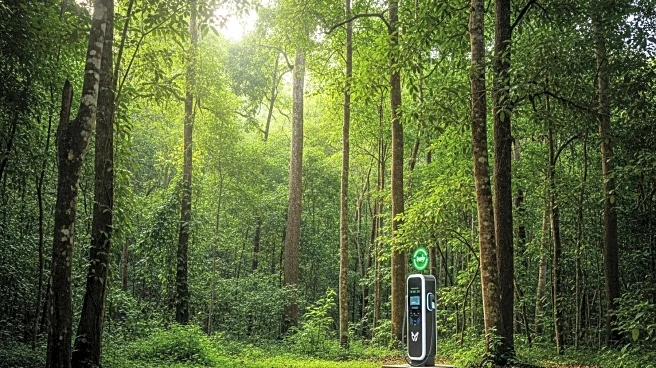What is the story about?
What's Happening?
Southeast Asia is emerging as a significant player in the electric vehicle (EV) industry, driven by rapid growth in EV sales and substantial investments in battery and component manufacturing. Governments in the region have implemented supportive policies to promote electric cars, aligning with their climate goals. While EVs offer environmental benefits, such as reduced noise pollution and zero tailpipe emissions, they also present complex trade-offs. The production process, particularly the extraction of nickel for EV batteries, has raised ecological and social concerns. Indonesia, home to the world's largest nickel reserve, faces challenges related to deforestation, water contamination, and human rights abuses linked to nickel mining. Despite the economic opportunities created by foreign investment, the benefits are unevenly distributed, favoring those with specific qualifications.
Why It's Important?
The rise of the EV industry in Southeast Asia has significant implications for global supply chains and environmental sustainability. The region's transition to electric vehicles can substantially reduce carbon emissions, contributing to global climate change goals. However, the environmental and social costs associated with nickel mining highlight the need for responsible resource management. The dominance of Chinese companies in Indonesia's nickel sector raises concerns about supply chain control and industrial dependency. As Southeast Asia integrates into the global EV ecosystem, it must balance economic growth with environmental protection and equitable benefit distribution. The region's ability to develop its own EV industry and technology will determine its role as a strategic partner rather than just a market.
What's Next?
The Indonesian government has revoked licenses for several mining companies in response to public pressure, but illegal mining activities persist. Local campaigners continue to advocate for stricter regulations and enforcement to protect vulnerable ecosystems and communities. As Southeast Asia's EV market grows, there is potential for technology transfer and increased competitiveness in the automotive industry. However, concerns remain about the region's ability to develop its own EV technology and industry. Stakeholders must address these challenges to ensure sustainable growth and equitable distribution of benefits.
Beyond the Headlines
The environmental impact of nickel mining in Indonesia, particularly in areas like the Raja Ampat archipelago, poses ethical and cultural challenges. The destruction of sacred sites and traditional livelihoods raises questions about the long-term consequences for local communities. The dominance of foreign companies in the nickel sector highlights issues of industrial dependency and the need for technology transfer. As Southeast Asia navigates its EV revolution, it must consider the broader implications for its economy, society, and environment.















